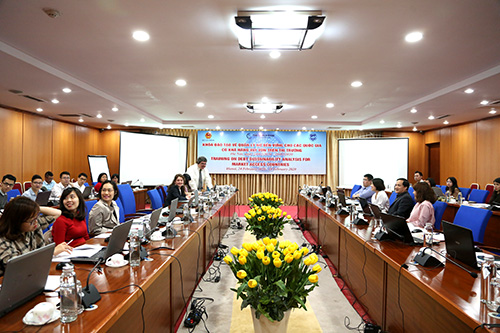 Economy
Economy


|
| A training course on sustainable national debt management is taking place in Hanoi as part of Vietnam’s public debt management reform programme.— Photo thoibaotaichinhvietnam.vn |
HÀ NỘI — A training course on sustainable national debt management is taking place in Hanoi as part of Vietnam’s public debt management reform programme.
The event is being jointly organised by the Ministry of Finance (MoF), the World Bank (WB) and the International Monetary Fund (IMF) from February 24-28.
According to Võ Hữu Hiển, deputy general director of the MoF’s Department of Debt Management and External Finance, the ministry will coordinate with relevant departments, sectors and localities to draw up a five-year plan on borrowing and repaying public debt in the 2021-25 period to submit to the Prime Minister for consideration before June 30.
The plan will include a public debt ceiling and safety threshold for indicators of public and government debts compared to GDP, and a target for direct government debt repayments compared to the State budget, he said.
Currently, debt sustainability analysis (DSA) is one of the key debt management models that is closely connected to analyzing, forecasting and performing debt portfolio risk management operations to ensure public debt safety and national financial security.
However, DSA has so far only been evaluated by IMF experts in the framework of their working visits to Vietnam without the direct participation of representatives from the MoF as well as relevant Vietnamese agencies to research the operation of the model.
Hiển highlighted the significance of the training course, saying that it contributed to enhancing capacity building activities as well as to developing strategic reports for not only the MoF but also other agencies.
He expressed his hope that the course would provide practical lessons as well as policy implications for Vietnamese agencies in building, appraising, approving, implementing and monitoring the implementation of medium-term loan and repayment plans to ensure sustainable debt calculation. — VNS




